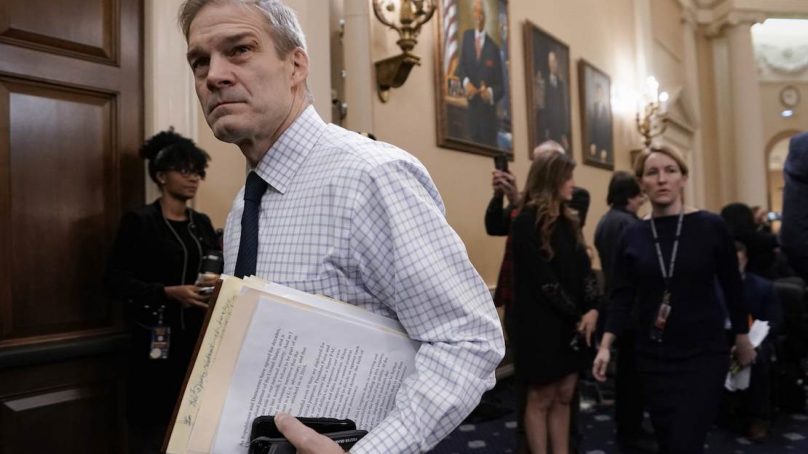
Thursday’s – March 9 the second held by the US House of Representatives’ Select Subcommittee on the Weaponisation of the Federal Government, featured testimony by investigative journalist Matt Taibbi and author Michael Shellenberger, who contributed to prior “Twitter Files” releases.
The second session addressed, among others, revelations regarding the Virality Project and its efforts to remove factually true tweets about Covid-19 vaccines.
According to Taibbi, the Virality Project “used the word ‘true’ three times” in its document, in reference to “people telling their own stories of true vaccine side effects.”
“So, these are people who are telling about their own experiences, things that happened to them that are true and they’re being suppressed,” Taibbi said.
Shellenberger said, “This is very disturbing, because what they’re doing when they’re putting these labels on … is trying to discredit you. It’s a form of censorship, but it’s also a disinformation campaign.”
The Defender previously reported the stories of several vaccine injury victims whose posts containing information about their vaccine injuries were censored by social media platforms. The hearing also addressed previous revelations that the Biden administration sought to censor Kennedy’s January 22, 2021, tweet about the then-recent death of baseball Hall of Famer Hank Aaron, 18 days after he publicly received the Moderna vaccine.
Subcommittee chair Representative Jim Jordan (Republican-Ohio) entered Kennedy’s tweet into the record, “along with the statement from the White House, the Biden White House, two days into the administration when they’re directly attacking people’s First Amendment liberties.”
Representative Thomas Massey (Republican-Kentucky) addressed previous efforts by the Centres for Disease Control and Prevention to censor tweets about natural immunity to Covid-19 – just days before federal and military vaccine mandates were introduced.
And in his testimony, Shellenberger referred to Twitter’s placement of Jay Bhattacharya, professor of medicine at Stanford University and co-author of the “Great Barrington Declaration,” on a blacklist because he tweeted that children would be harmed by lockdowns.
By blacklisting Bhattacharya – without his knowledge – Twitter prevented his tweets from trending.
During Thursday’s hearing, Shellenberger said he has been similarly censored by Facebook, and described Bhattacharya’s blacklisting as “East Germany, Stasi kind of behavior” and an example of an “Overton window,” where speech is limited to “what is mainstream at the time.”
Both Taibbi and Shellenberger warned of the dangers of government policing of speech and of government collusion with private actors for this purpose.
Shellenberger said, “Today, American taxpayers are unwittingly financing the growth and power of a Censorship-Industrial Complex run by America’s scientific and technological elite, which endangers our liberties and democracy.
“I’m grateful for this opportunity to offer this testimony and sound the alarm over the shocking and disturbing emergence of state-sponsored censorship in the United States of America.”
Taibbi said, “The original promise of the internet was that it might democratize the exchange of information globally. A free internet would overwhelm all attempts to control information flow. Its very existence [is] a threat to anti-democratic forms of government everywhere.
“What we found in the [‘Twitter Files’] was a sweeping effort to reverse that promise and use machine learning and other tools to turn the internet into an instrument of censorship and social control. Unfortunately, our own government appears to be playing a lead role.”
Shellenberger said the ‘Twitter Files’ and also lawsuits against the federal government “have revealed a large and growing network of government agencies, academic institutions and non-governmental organisations that are actively censoring American citizens, often without their knowledge, on a range of issues.”
“It is axiomatic that the government cannot do indirectly what it is prohibited from doing directly,” said Shellenberger in reference to the federal government’s use of private organisations as proxies for the removal of content from social media platforms.
Taibbi likened efforts to combat alleged “misinformation, disinformation or malinformation” as “a form of digital McCarthyism,” which has extended beyond social media platforms to the removal of individuals’ accounts on platforms such as PayPal and GoFundMe simply as a result of the content they shared on social media.
“It is important to understand how these groups function,” Shellenberger said. “They are not publicly engaging with their opponents in an open exchange of ideas. They aren’t asking for a national debate over the limits of the First Amendment.”
“Rather,” he said, “they are creating blacklists of disfavoured people and then pressuring, cajoling and demanding that social media platforms censor, de-amplify and even ban the people on these blacklists.”
Claiming the government is using methods of psychological manipulation and highly sophisticated computing tools, such as artificial intelligence, for these purposes, Shellenberger said that “populist, alternative and fringe” views are being targeted, simply based on “the assertion that the opinion you expressed … is wrong.”
According to Taibbi, voices across the political spectrum have been targeted, “The people affected include Trump supporters, but also left-leaning sites like Consortium and Truthout, the leftist South American channel teleSUR [and] the Yellow Vest Movement.”
Shellenberger pointed out that in 2020, the Aspen Institute urged journalists to “break the Pentagon Papers principle,” previously held up as a paragon of investigative journalism, “and not cover leaked government information, to prevent the spread of ‘disinformation.’”
Shellenberger shared some proposals to the subcommittee, including, “Congress should immediately cut off funding to the censors and investigate their activities. It should mandate instant reporting of all conversations between social media executives, government employees, and government contractors concerning content moderation.
“And finally, Congress should limit the broad permission given to social media platforms to censor, deplatform and spread propaganda.”
Taibbi said he was “horrified” by the media’s collusion with the government’s censorship efforts, saying it has become “an arm of a state-sponsored thought-policing system.”
He added: “The First Amendment and American population accustomed to the right to speak is the best defence left against the Censorship-Industrial Complex. If it can knock over the first and most important constitutional guarantee, it will have no serious opponent left anywhere.
“If there’s anything the Twitter Files show, it’s that we’re in danger of losing this most precious right, without which all democratic rights are impossible.”
Thursday’s hearing was contentious at times, with Democratic members of the subcommittee asking the two witnesses to reveal their sources, accusing them of cherry-picking internal Twitter documents “out of context” and focusing only on the Biden administration.
One subcommittee member referred to the two witnesses as “so-called journalists” and “Elon Musk’s public scribes,” while Taibbi was referred to as “Elon Musk’s hand-picked journalist” who has “made money that [he] did not have before.”
Musk, owner and CEO of Twitter, was accused of working with countries such as “Qatar, Saudi Arabia, and possibly even Russia and China.”
Jordan, however, described the witnesses as “brave individuals for being willing to come,” adding, “I think they’re here to tell us the truth.”
On Thursday, concurrently with the hearing and the latest “Twitter files” release, the House narrowly passed a bill, the Protecting Speech from Government Interference Act, that will ban federal officials from pressuring tech platforms into censoring content.
According to The Hill, the bill would “would prohibit law enforcement officials from sharing information with social media companies unless it pertains to speech not protected by the First Amendment — such as obscenity, fraud or incitement to imminent lawless action.”
- A Tell / The Defender report











